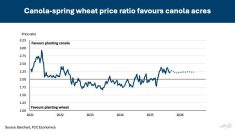United States President-elect Joe Biden’s climate strategy will lay waste to the tired opposition some Canadians have to our country’s carbon pricing policy.
Biden campaigned on aggressively combating climate change.
When he becomes president in January, it is expected he will create investment in green technologies.
Like Canada, the U.S. will soon be trying to reach net-zero greenhouse gas emissions by 2050 and achieve the targets set out in the Paris Agreement.
How the Americans try to get there will surely differ from Canada’s approach.
Read Also

Footflats Farm recognized with Ontario Sheep Farmers’ DLF Pasture Award
Gayla Bonham-Carter and Scott Bade, of Footflats Farm, win the Ontario Sheep Farmers’ 2025 DLF Ontario Pasture Award for their pasture management and strategies to maximize production per acre.
On top of a $2 trillion investment in the green economy, Biden is expected to try to impose a “carbon border adjustment” that would tax imported goods, based on their carbon emissions, from polluting countries.
For years, Canadian producers have decried carbon pricing — arguing it disproportionately impacts operations, disadvantages them competitively on international markets and creates a cost that can’t be passed to consumers.
There will always be room for Canada’s carbon pricing policy to improve, but the policy is here to stay.
Around two-thirds of people who voted in the last election cast their ballot for a party that supported or promoted a price on pollution or carbon tax, demonstrating once again a strong climate plan is needed to get elected.
Most opponents of a carbon tax have turned their attention elsewhere during the pandemic. Lobby groups and politicians criticizing the policy just don’t gain much traction anymore.
Now, with Biden’s election, Canada’s climate policy may end up benefitting farmers.
Putting a price on carbon does not make Canada a lone wolf. Neither do policies aimed at combatting climate change.
The European Union is trying to introduce a carbon border adjustment and there is a growing effort on the international stage to standardized credits around a price on carbon.
Because Canada already has a price on carbon across each of its industries, including those that pollute the most, it has a strong argument to be excluded from carbon border adjustments being proposed by the EU and Biden.
The U.S., in particular, won’t surprise anyone if it excludes Canada from its carbon border adjustment, considering the friendly history between Biden and Trudeau.
Canada took significant steps to reorganize its economy and put a price on carbon. These difficult steps have put it in a better position to face an emerging economic order where carbon emissions matters.
Despite countless challenges ahead, a strong international carbon market means farmers in Canada using sustainable agriculture are already well positioned to participate, and maybe even succeed in that emerging market.
There will likely be a web of different protocols to generate credits, and markets to sell those credits in, as different nations and the international community establish standards.
Huge amounts of technology will likely be needed at the farm level to properly monitor the data needed to gain credits, too.
But Canadian producers are already ahead of the game on much of this.
In recent years a whole industry has been created out of carbon markets, many of them headquartered near western Canada’s oil and gas sector.
If the market grows as many are now expecting it to, at least some American producers will be playing catch up to their Canadian counterparts.
Within a few years, Canada’s price on carbon may go from being one of the nations’ most hotly contested policies to one of its most celebrated.
Perhaps that’s being too hopeful, but it is already clear Biden’s climate strategy will smother Canadian opposition to a price on carbon.
Producers, and other opponents to these policies, should recognize environmental regulations will continue poking into their businesses.
Rather than outright opposing them, or calling for blanket exemptions, they should work to improve them.















